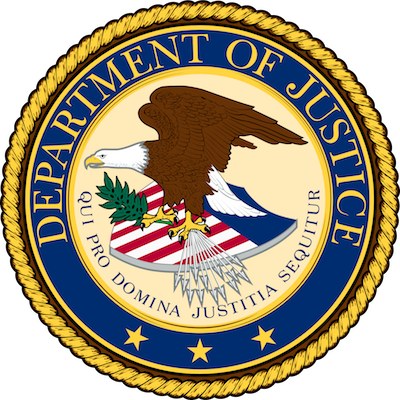Reversal of the Wire Act could potentially affect all forms of legalized online gambling
It came to light this week that in November 2018 the U.S. Department of Justice (DoJ) reversed the 2011 opinion that the Wire Act only applied to sports betting. The decision made all interstate poker and casino gambling illegal, but the opinion didn’t stop there. It also stated that “We further conclude that that the 2006 enactment of UIGEA did not alter the scope of the Wire Act.” Hence, the current online casinos and poker rooms in New Jersey, Nevada and Delaware may be at risk and the interstate poker agreement between the three states would almost certainly have to cease. The opinion could also make daily fantasy sports illegal should the DoJ decide that it is indeed interstate online gambling. The DoJ has given 90 days for states to comply, but it’s almost certain that the states will fight the DoJ and we could soon see the whole situation taken to the Supreme Court of the United States. At the current time it would appear that online gambling if done totally within a state’s borders is legal, but the DoJ has also gone on record in the past to say that all online gambling is interstate in nature and hence this could be a first attempt to amend the UIGEA and make intrastate online gambling illegal as well.
 One group celebrating the decision is Sheldon Adelson’s team, who fought for this new opinion. There is no doubt Adelson was instrumental in having the new opinion enacted. Sheldon Adelson is a large Republican donor who gave $30 million to Trump for his presidential campaign and $100 million to the Republican party for the midterm elections. Consequently, he has curried favor with many Republicans including some stalwarts like Lindsay Graham and Jason Chaffetz, who took his RAWA bill to Congress for consideration and Paul Ryan, Marco Rubio and Charlie Dent who championed his bill. And by many accounts, he had a good affiliation with Attorney General Rod Rosenstein as well. In fact, the Republican Party is so indebted to Sheldon Adelson that in November, around the same time the opinion on the Wire Act was changed, Donald Trump presented Sheldon Adelson’s wife, Miriam, the Presidential Medal of Freedom. And Sheldon Adelson was prominent at the ceremony. Many notable people decried the award to Adelson as scandalous and suggested it was given to her strictly as a thank you for the Republican donations and not based on merit. Robert Weissman, president of the group Public Citizen stated the following after the ceremony about awarding the medal to Miriam Adelson:
One group celebrating the decision is Sheldon Adelson’s team, who fought for this new opinion. There is no doubt Adelson was instrumental in having the new opinion enacted. Sheldon Adelson is a large Republican donor who gave $30 million to Trump for his presidential campaign and $100 million to the Republican party for the midterm elections. Consequently, he has curried favor with many Republicans including some stalwarts like Lindsay Graham and Jason Chaffetz, who took his RAWA bill to Congress for consideration and Paul Ryan, Marco Rubio and Charlie Dent who championed his bill. And by many accounts, he had a good affiliation with Attorney General Rod Rosenstein as well. In fact, the Republican Party is so indebted to Sheldon Adelson that in November, around the same time the opinion on the Wire Act was changed, Donald Trump presented Sheldon Adelson’s wife, Miriam, the Presidential Medal of Freedom. And Sheldon Adelson was prominent at the ceremony. Many notable people decried the award to Adelson as scandalous and suggested it was given to her strictly as a thank you for the Republican donations and not based on merit. Robert Weissman, president of the group Public Citizen stated the following after the ceremony about awarding the medal to Miriam Adelson:
"It’s emblematic of the corrupt and transactional presidency of Donald Trump, and it is a shame, but not a surprise, that he is corroding and corrupting a civic treasure, an honor like the Medal of Freedom."
It’s quite conceivable that Adelson used the ceremony as an opportunity to sit down with Trump and the DoJ and remind them about RAWA, while reminding them who butters their bread.
But what is most concerning about the reversal in opinion is that it was based on nonsense rather than fact. The whole notion behind the acronym RAWA, Restore America’s Wire Act, is that the Wire Act, as written in 1961 by Robert F. Kennedy, was intended to stop all forms of gambling. But in truth, the Wire Act only mentioned sports and contests:
"Whoever being engaged in the business of betting or wagering knowingly uses a wire communication facility for the transmission...of bets or wagers or information assisting in the placing of bets or wagers on any sporting event or contest...shall be fined under this title or imprisoned not more than two years, or both."
The purpose of the Wire Act was to give the police a means to arrest illegal bookies. Casino gambling and poker was also taking place in 1961, but it wasn’t a concern of the DoJ at the time because the mobsters were concentrating on sports bets. And lotteries didn’t exist in the U.S. at that time, so it’s not possible that lotteries could have been envisioned when writing the Wire Act.
The court system under George W. Bush realized this too, when the 5th Circuit Court of Appeals denied a lawsuit by a citizen who argued he shouldn’t be liable for a Mastercard charge that was used to purchase chips at an offshore online casino, since in his opinion Mastercard aided and abetted the offshore casino to violate the Wire Act. The 2002 lower court and the appellate court ruled that the bettor was still responsible and couldn’t cite the Wire Act as a defense since in the courts’ opinion the Wire Act only applied to sports bets or contests, thus online casino chips were excluded from that law. The 2011 opinion noted the 5th Court decision and indicated they were simply clarifying and confirming what the other courts already ruled – that the Wire Act only applied to sports bets.
So why did the DoJ decide to change that opinion now?
It’s impossible to be sure, but one suggestion is that Congress wants to pass a Federal law for online gambling and to do so they first need to make all state sponsored online gambling illegal first. Some analysts believe the Supreme Court set a precedent by striking down PASPA and allowing states to offer sports betting, so the DoJ now wants to ensure that all sports betting must be done at land-based facilities and not online. Other experts believe John Kyl petitioned the DoJ heavily after his return to the Senate following John McCain’s death and his influence was instrumental in convincing the DoJ to strike while the iron was hot. And many analysts believe it was simply a thank you to Sheldon Adelson to ensure he continues to support the party and possibly increase contributions in the future. But one other very viable reason is that the action was Rod Rosenstein’s opportunity to get rid of a pet peeve. It could also be his swan song should he leave his position in the near future.
When Jeff Sessions was under attack by Trump as U.S. Attorney General and Rod Rosenstein assumed the role of Deputy AG, I wrote an article stating that Rosenstein could be a disaster for online gambling interests given his past actions.
In the article I noted that Rosenstein, when Attorney General for Maryland from 2005 to 2017, was directly responsible for shutting down NETeller and other payment processing companies for online gambling, citing them for money laundering. He was also responsible for the seizures of many gambling site domain names in 2011, including Bookmaker.com, TruePoker.com and later Bodog.com, stating that online gambling was responsible for terrorism and organized crime. Effectively he said that much of America’s problems could be pinpointed to online gambling. In fact, several people I spoke to who have been close to Rosenstein said he absolutely hates gambling in all its forms and defeating gambling, particularly online, is his cause du jour.
So what? For that, one needs to look at the timing of the DoJ opinion, as well as Donald Trump. Trump was furious at Jeff Sessions for recusing himself in the Russia investigation and in November 2018 Sessions stepped down as AG. Matthew Whitaker took over as acting AG, but for all purposes Rod Rosenstein was in charge during the turnover. For the period between when Sessions left and when Whitaker fully took the helm, Rosenstein called the shots. So it’s quite conceivable he took the opportunity to meet with the rest of his team to push through his cause – defeating online gambling. This needed to be done while he had the power and also while he still had a job.
Rosenstein appointed Robert Mueller as special council to get to the bottom of the Russian election scandal and it’s no secret that Trump is not happy with the way the Mueller investigation is going. Moreover, it came to light last year that Rosenstein suggested to the Times after Trump fired James Comey that the government should consider invoking the 25th amendment to oust Trump for that action. And while Trump has said he will not fire Rosenstein for appointing Mueller, it is also true that Trump’s word is worth little, especially when it comes to firing people. Trump said at various times he was happy with Rex Tillerson, Stephen Bannon, John Kelly, James Mattis, et al. before firing them. And if Trump senses disloyalty, he makes it a mission to make sure that person leaves. By September most media sources were certain that Rosenstein’s dismissal was just a matter of time. If that was indeed the case, then Rosenstein likely felt that he was going to be let go, so defeating online gambling by issuing a new opinion could very well be a move by Rosenstein felt was necessary to make himself feel good and seal his legacy as the anti-gambling AG. This was going to be his swan song. Also, it would win great favor to Sheldon Adelson should he choose to run for higher office in the future. And as we know Adelson gives large campaign donations to those he really likes.
In any case, the decision has now been changed and it’s almost certain that this new opinion will convince the states they need to head to the Supreme Court to decide whether online gambling is legal or not and what limitations, if any, the states must adhere to. And SCOTUS will once again have to weigh in whether states’ rights supersede a Federal law and opinion in the area of gambling. And just because SCOTUS sided with the states and repealed PASPA doesn’t mean they will side with them for online gambling. But any way you slice it, this new opinion is unfortunate and unnecessary.
Read insights from Hartley Henderson every week here at OSGA and check out Hartley's RUMOR MILL!







































